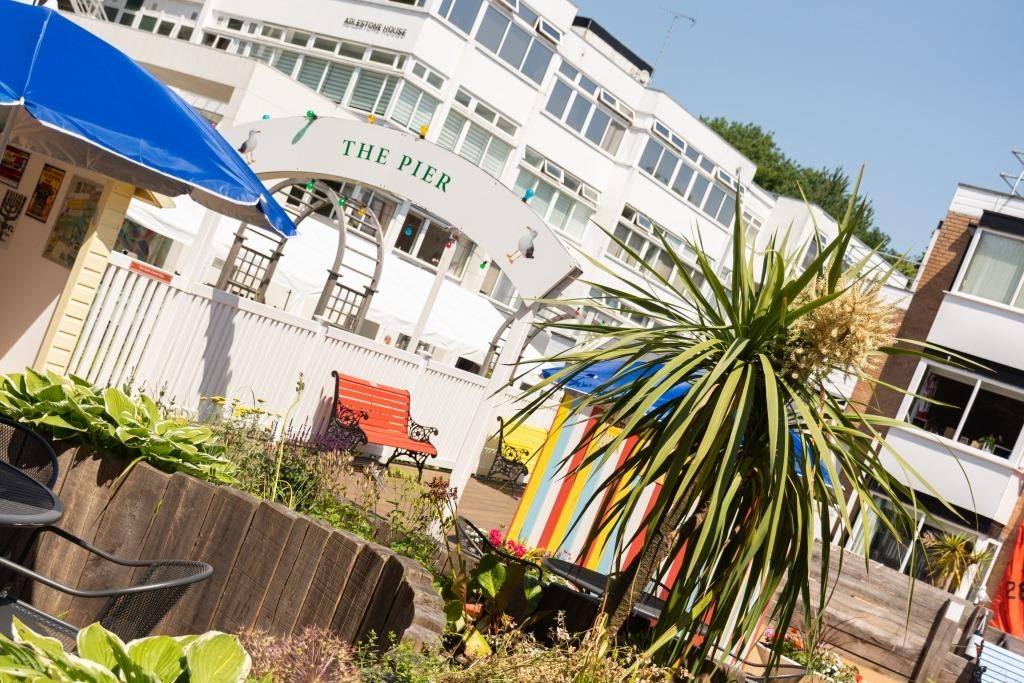The end of June saw the long-awaited opening of Beach House, a £1.6m state-of-the-art residential household for people living with dementia in Heathlands Village.
The twenty bed wing, accommodated within the existing main building, employs the very latest design and technology to cater for the specific care needs of the most vulnerable people in our community.
This is the latest stage in an ongoing capital investment strategy, going back to 2010 and the merger of the ‘old’ Fed and Heathlands Village. So far the cost of upgrading the near-fifty- year old home has reached £15m.
CEO Mark Cunningham explains, “The site’s layout and infrastructure had become unfit for the care of a generation of older people, living longer, yet with far greater and more complex care needs.”
“The very fabric of the building – roofing, drainage, central heating and kitchens were desperate for refurb. Just as individuals purchasing an old house may have to rewire and install a damp proof course, so we needed to retrofit and future-proof our buildings at Heathlands Village.”
“That was the ‘hidden’ work. In addition we undertook major upgrades to virtually the whole site – creating a new approach road away from the buildings; a stunning new reception, indoor and outdoor communal areas and new residential and nursing living areas. We’ve created a place that people love to live in, work at and visit.”
Bernie Yaffe, Fed Treasurer and Chairman elect, explains “These fundamental improvements to Heathlands Village have only been possible due to the success of a robust capital fundraising drive, which was responded to with enormous generosity by a number of trusts and individual donors from the community. They demonstrated full confidence in our vision for a 21st century dementia-friendly home.”
But Mr Yaffe is keen to point out the distinction between capital funding for specific building projects of this kind and other crucial funding required for day-to-day operations.
“Essentially, we have to fundraise for two distinct pots on an annual basis, one for capital projects and one to cover our operating deficit. Proper governance dictates that we cannot mix the two.”
“Our deficit runs at about £1.5m per annum. It represents the difference between our income from various sources – local authority grants towards certain staff salaries in our community care services; charity shop revenue; fees from private residents of Heathlands Village and the costs of running our services to provide care in the community and at Heathlands Village. Our wage bill alone is £5.9m.”
“Fundraising to help bridge the gap is vital. We raise money from twice yearly appeals, a telethon, one-off donations, legacies, events, and regular pledges made at our dinners. That pot relies on the community to regularly support us – taking on challenges like bike-rides and sky-dives and coming along and supporting the comedians at The Laughter Factor; remembering us when celebrating a big birthday or anniversary, leaving us a lasting gift in a will. This is the life-blood of our numerous projects and departments.”
“The problem is that The Fed may have become a victim of its own success. There’s a perception out there that we are cash rich but that is absolutely not the case. I think it’s because we’ve been so successful raising money to rejuvenate Heathlands Village.
“Trust and funding opportunities arise from time to time and when we apply successfully, the money brought in has to be used solely for the purpose for which it was obtained – anything else would be fraudulent.

“And many donors of sizeable amounts prefer to be able to identify a physical realisation of their generosity – whether a room, wing or garden area dedicated to their loved ones – that’s human nature.”
“Helping, for example, to foot our salaries bill is nowhere near as attractive. We understand that. But without our social workers, sessional workers, care and nursing staff and volunteer coordinators and so on, we would not be able to offer care either at Heathlands Village or in the community.
It is vitally important that we have the support of a large cohort of donors whose individual contributions may be more modest, but who as a group mean the difference between a service continuing or having to be closed.
Rounding off, Mr Cunningham says, “The challenges we face are not getting any easier. Cutbacks in Local Authority funding continue; we face further increases in the National Living Wage and our people costs currently represent close to 80% of our cost base.”
Whilst as you can see we are doing everything possible to invest in our future, we also rely on the very generous support of the community for the day-in-day-out provision of care.
We have to have the community’s support to cover the shortfall in funding of our residents, as well as continuing our essential work in the community – dealing with homelessness, horrendous loneliness; appalling poverty and child abuse. That is the stark reality.”